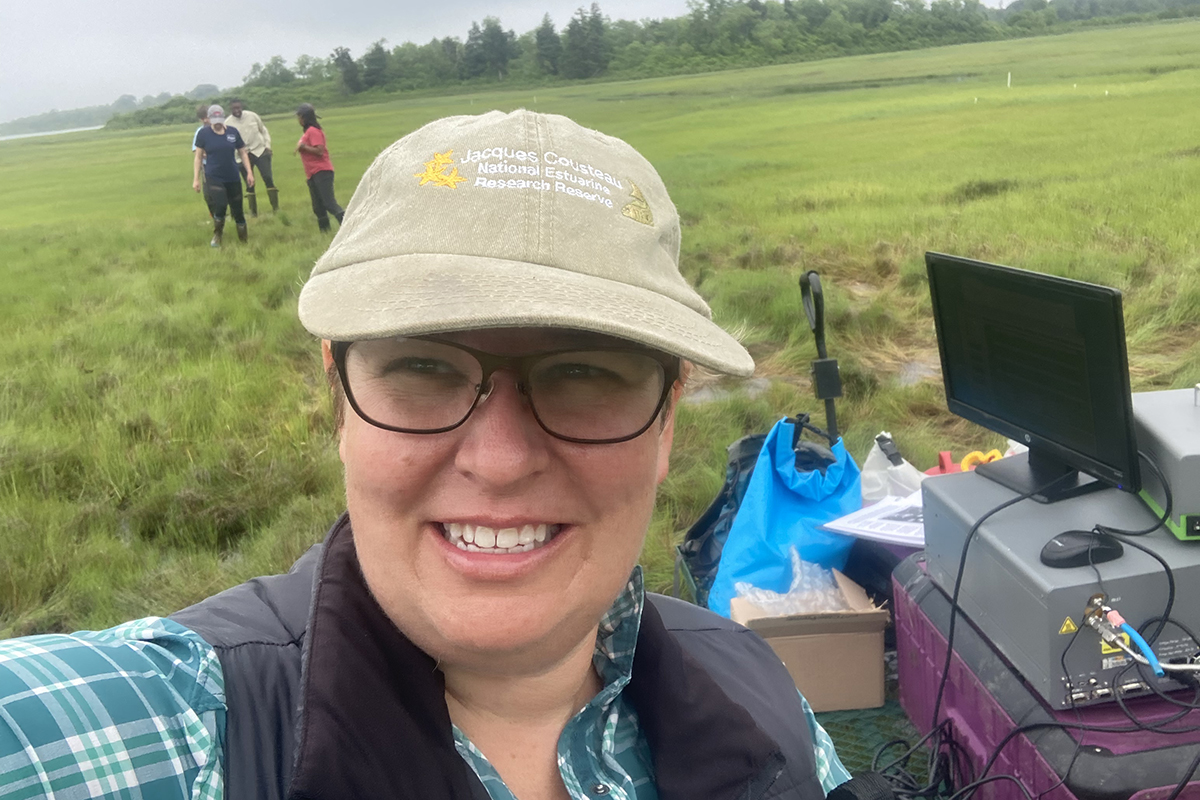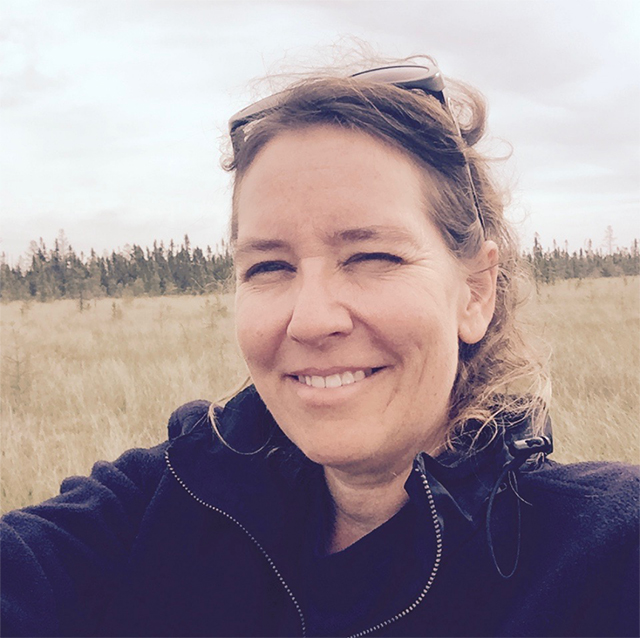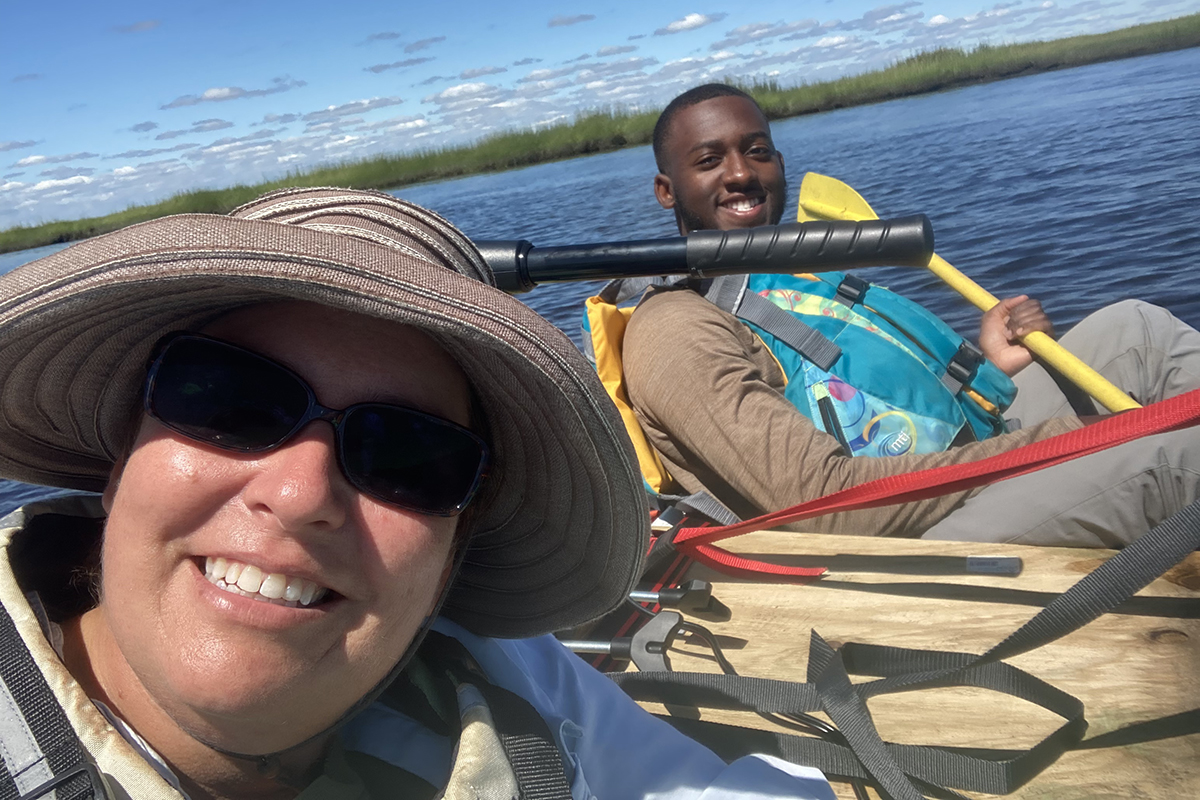Facing Climate Change: Meet Associate Professor Elizabeth Burke Watson, PhD
By Gina Myers
 Elizabeth Burke Watson, PhD, in the field with students from Boston University and Drexel at Narragansett Bay National Estuarine Research Reserve, where they were taking greenhouse gas flux measurements using a cavity ring-down spectroscopy device.
Elizabeth Burke Watson, PhD, in the field with students from Boston University and Drexel at Narragansett Bay National Estuarine Research Reserve, where they were taking greenhouse gas flux measurements using a cavity ring-down spectroscopy device.
October 29, 2021
Although Elizabeth Burke Watson, PhD, has been studying climate change impacts for the past 20 years, she had a transformative experience when it touched her family.
“My father was very ill, living in a board and care home in Santa Rosa, California that specialized in hospice patients when the North Bay Fires broke out in 2017. The property he lived on was burned over, and while all of the hospice residents were evacuated safely, they evacuated driving down Mark Springs West Rd., while the hills burned around them. That afternoon and evening, hundreds of wildfires started, and the fire found them at the location they evacuated to, just as they settled in. The residents and staff were forced to evacuate a second time as the fire was racing towards them,” she explains.
Dozens of people died that night, and many of them were elderly like Watson’s father, emblematic of how climate change disproportionately affects those least able to respond. While Watson felt called to do something more to address climate change, she also felt that she needed to use her individual choices to do something beyond reducing her family’s carbon footprint. Watson has decided to focus on her abilities as a teacher and mentor to make a difference in the fight for climate justice.
To this end, Watson designed the new Climate Change minor, bringing together courses from across the University to help students focus their studies and be prepared to meet the climate crisis. She is also working with Akilah Chatman who helped develop the Climate Action Plan for Abington Township as part of a Drexel program. Watson’s students are gaining hands-on practical experience leading climate action and sustainability initiatives.
 Elizabeth Burke Watson, PhD, at Big Bog in Minnesota, the largest bog in the lower 48 states.
Elizabeth Burke Watson, PhD, at Big Bog in Minnesota, the largest bog in the lower 48 states.
Further, Watson’s passion for coastal science has become a tool for change through research projects that have the power to inform governmental policy, conservation, management and restoration.
A Dynamic Puzzle
Watson first became interested in earth science when she took a geography course to fulfill a general education requirement as a community college student. Inspired by the professor, she decided to take more classes in the field, and eventually completed her doctorate in physical geography at the University of California, Berkley.
“I fell in love with the work Roger Byrne, who wound up being my PhD advisor, specialized in, which is Quaternary paleoecology. I studied climate and environmental change over the last 10,000 years to understand how human impacts and climate have affected ecosystems,” she says.
Through following her own research interests, Watson decided to specialize in coastal science. “Coastal areas are dynamic. There are a lot of puzzles to investigate because the physical and biological processes are so interlinked. You have tides—so every day the tide comes up and down. You have inter-annual variability. For example, in California, we have much higher sea levels during El Niño events because there is a bulge of water in the eastern Pacific,” she explains. “More recently we have things like marine heat waves and increasingly severe storms that affect coastal areas, so there’s a lot of different processes going on and different time scales. I just got interested in how things varied and why and how all these processes are interlinked, with the goal of trying to understand how we can sustainably manage those areas.”
Additionally, coastal regions have an important role to play when it comes to climate change. Watson explains, “Coastal areas can help provide a buffer to reduce storm surge heights, and they can prevent flooding and erosion. They can also sequester greenhouse gases.”
Maintaining these areas is crucial in the fight against climate change, not to mention that these wetlands also serve as the home to a variety of wildlife.
Current Research
Watson joined Drexel in 2015, after working in the Environmental Protection Agency’s Office of Research and Development, where she produced climate change impact studies. She is the director of the Wetlands Section at the Academy of Natural Sciences, and she runs the Coastal Change Lab, whose goals is “to better understand the impacts that humans are having on coastal processes and ecosystems so that coastal environments can be better managed.” The lab’s work is conducted through field and laboratory research combined with geospatial analysis and modeling.
Watson currently has active research projects in the Mid-Atlantic, New England, California, Latin America and the Caribbean — “I’m not interested in working in the [American] South because they have alligators and cottonmouths,” Watson jokes. Her projects are in collaboration with environmental management and stewardship organizations, including Save the Bay, The Nature Conservancy, the EPA and the National Estuarine Research Reserve System.
 At Tuckahoe Wildlife Management Area in South Jersey, Watson and environmental science senior Daouda Njie are pictured in a boat that Njie constructed by connecting two kayaks together and adding a trolling motor.
At Tuckahoe Wildlife Management Area in South Jersey, Watson and environmental science senior Daouda Njie are pictured in a boat that Njie constructed by connecting two kayaks together and adding a trolling motor.
One current project investigates how the hydrology of coastal wetlands is affected by rising sea levels. “It’s looking at water exchange in places we call ghost forests—where the forest is dying off and you have standing dead trees and wetland plants moving in,” says Watson. “We also look in places where coastal wetlands are becoming waterlogged, the plants are disappearing, and it is converting to open water. We chose sites where you can see from historic aerial imagery that there are rapid transitions happening.”
Watson recently co-authored the article “The status and future of tidal marshes in New Jersey faced with sea level rise,” which found that the current rates of sea level rise exceeds most marsh elevation gains. The article notes that proactive steps are necessary if coastal wetland ecosystems are to be maintained over the next few decades and makes recommendations for addressing the current trend of marsh loss.
Understanding how the water is changing and affecting the land is essential for conservation and restoration efforts, which is also important for addressing climate change because of the various benefits coastal wetlands offer.
One of those benefits is the focus of another of Watson’s research projects, which is looking at greenhouse gas sequestration through wetland restoration projects. “It’s very broadly applicable to a lot of different places. We’re want to have environmental policies that can mitigate climate change,” she says.
One way that environmental policy could help mitigate climate change is through the Regional Greenhouse Gas Initiative (RGGI), which New Jersey recently re-joined, after leaving the program during the Christie administration. The program in New Jersey uses a carbon tax to fund forestry and wetland restoration projects that help sequester greenhouse gases, as well as supporting residents most impacted by climate change. Pennsylvania is taking steps to join RGGI, and is the only Northeastern state not yet a member.
These are steps in the right direction, and actions that Watson advocates for through her roles on science advisory boards that make recommendations to state governmental agencies. Watson is also advancing sustainability, scalability and the evidence-base of adaptation through her work with the Consortium for Climate Risk in the Urban Northeast (CCRUN), a group of natural, applied and social scientists that recently received a grant from the National Oceanic and Atmospheric Administration Climate Program Office’s Regional Integrated Sciences and Assessments (RISA) program.
The goal of the grant program is to expand regional capacity to adapt to climate change. CCRUN will conduct collaborative research across climate science, coasts and floods, public health, engineering and urban design, equity, and social, behavioral and economic science. They will share their findings with various stakeholders and decision-makers to help build climate resilience in the region.
A Positive Forecast
When it comes to climate change and the future, Watson is optimistic. It’s not all doom and gloom like some media outlets would lead readers and viewers to believe. For this reason, Watson thinks one of the most important things people can do is to talk about climate change in a proactive way.
“It’s important to talk about climate change in a way that doesn’t depress or scare people, but in a way that is empowering and shows that we can transform the way we’re living our lives to become more sustainable and more equitable.”
Watson is also encouraged by actions that are being taken globally as well as those happening at the local level. “It’s really about community action,” she says.
This fall term, Watson is teaching Climate Films & Advocacy, with Ben Kalina, assistant professor of film and television in Westphal College of Media Arts and Design. In the course, students are examining global climate change and actions to address climate change through a variety of films, from those created to entertain to more informative films and films that advocate for specific actions.
The class will culminate in a student-led Climate Change Film Festival at the Academy of Natural Sciences, which will create more opportunities for education and conversation, and hopefully more encouragement for people to get involved with community action.
Watson says, “Climate change is definitely going to require changing how we think about things, so it’s important to start now.”